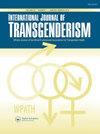印度跨性别女性的“跨性别身份污名”量表评估:探索性和验证性因素分析的结果
Q1 Social Sciences
引用次数: 21
摘要
背景:性少数群体的耻辱感已被证明会影响心理健康和性风险,但有关印度跨性别女性跨性别认同耻辱感的研究有限。我们根据印度的背景改编了变性恐惧症暴露量表,并在印度的变性女性中测试了一份包含14个项目的变性身份污名问卷(TGISQ)。我们旨在评估和验证TGISQ的因子结构,并评估其信度。方法:数据来自印度6个城市/半城市地区的300名跨性别女性(包括海吉拉/thirunangais)的横断面调查。TGISQ包括对14个项目的自我报告评分。我们首先使用主轴因子分解(PAF)和promax旋转进行探索性因子分析,并使用Cronbach's alpha评估可靠性(内部一致性);然后我们进行验证性因子分析来评估构念效度(因子效度)。通过计算跨性别身份污名量表(TGISS)与相关理论构念(如抑郁、社会支持)之间的Pearson相关关系,对最终的13项跨性别身份污名量表(TGISS)的构念效度进行检验。结果:PAF识别了两个因素:制定的耻辱感(5项)和感觉的规范性耻辱感(8项)。最终的13项TGISS具有较高的信度和可接受的构念效度。结论:TGISS具有足够的心理测量特性,使其成为第一个有效可靠的衡量印度跨性别女性所面临的耻辱和歧视的量表。未来的研究可以进一步完善TGISS,这可能有助于比较跨性别女性不同亚群之间的耻辱经历差异,并监测和评估耻辱减少项目的成功。本文章由计算机程序翻译,如有差异,请以英文原文为准。
Assessment of a “Transgender Identity Stigma” scale among trans women in India: Findings from exploratory and confirmatory factor analyses
ABSTRACT Background: Sexual minority stigma has been shown to influence mental health and sexual risk, but limited research is available on measuring transgender-identity stigma among trans women in India. We adapted an Exposure to Transphobia scale to the Indian context and tested a 14-item Transgender Identity Stigma Questionnaire (TGISQ) among trans women in India. We aimed to assess and validate the factor structure of the TGISQ and to assess its reliability. Methods: Data were from a cross-sectional survey among 300 trans women (including hijras/thirunangais) from six urban/semi-urban sites in India. The TGISQ consisted of self-reported ratings on 14 items. We initially conducted exploratory factor analysis, using principal axis factoring (PAF) and promax rotation, and assessed reliability (internal consistency) using Cronbach's alpha; we then conducted confirmatory factor analysis to assess construct validity (factorial validity). Construct validity of the final 13-item Transgender Identity Stigma Scale (TGISS) was also examined by computing Pearson's correlations between TGISS and relevant theoretical constructs (e.g., depression, social support). Results: PAF identified two factors: enacted stigma (5 items) and felt normative stigma (8 items). The final 13-item TGISS had high reliability and acceptable construct validity. Conclusions: The TGISS was found to have adequate psychometric properties, making it the first valid and reliable scale to measure stigma and discrimination faced by trans women in India. Future studies can further refine TGISS, which might help in comparing the differences in stigma experiences among diverse subgroups of trans women, and in monitoring and evaluating the success of stigma reduction programs.
求助全文
通过发布文献求助,成功后即可免费获取论文全文。
去求助
来源期刊

International Journal of Transgenderism
Social Sciences-Gender Studies
CiteScore
5.10
自引率
0.00%
发文量
0
期刊介绍:
International Journal of Transgenderism, together with its partner organization the World Professional Association for Transgender Health (WPATH), offers an international, multidisciplinary scholarly forum for publication in the field of transgender health in its broadest sense for academics, practitioners, policy makers, and the general population.
The journal welcomes contributions from a range of disciplines, such as:
Endocrinology
Surgery
Obstetrics and Gynaecology
Psychiatry
Psychology
Speech and language therapy
Sexual medicine
Sexology
Family therapy
Public health
Sociology
Counselling
Law
Medical ethics.
 求助内容:
求助内容: 应助结果提醒方式:
应助结果提醒方式:


